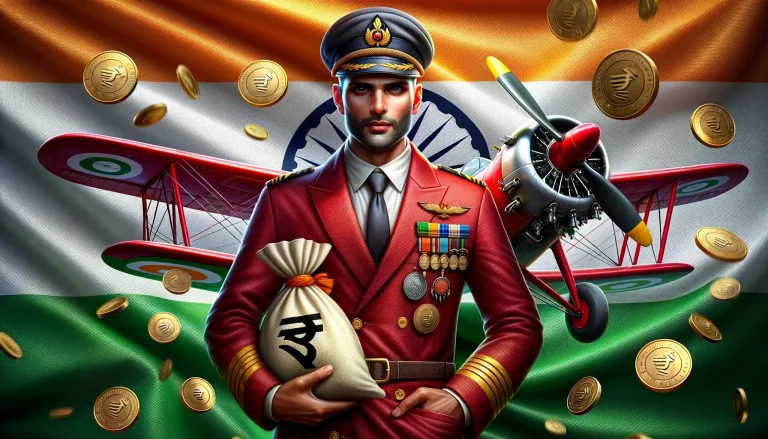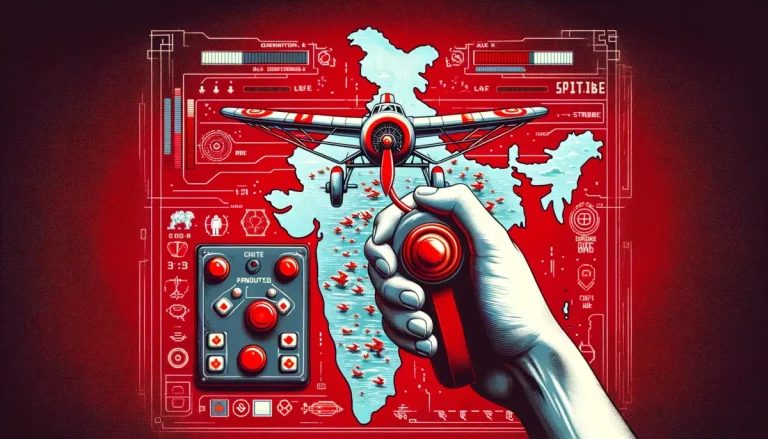A Game of Skill or Luck? Analyzing Popularity of Aviator by Spribe
A Game of Skill or Luck? Analyzing Popularity of Aviator by Spribe – I appreciate your interest in thoughtfully analyzing games like Aviator that balance skill and luck.
While tactics may sway odds to a degree, we must approach notions of mastery realistically. At its core, Aviator remains a game of probability despite skills that can influence outcomes.
No amount of prowess or strategy eliminates the element of randomness persisting at its center. Our focus should be on moderation – playing within affordable limits, avoiding over-investment, and embracing unpredictability.
Article Highlights
HideIf engaged in thoughtfully, Aviator can provide rewarding entertainment without unrealistic expectations. But maintaining perspective on its inherent volatility is essential.
With sensible participation, we allow excitement and wisdom to coexist responsibly. There are always complex dynamics at play, but upholding healthy gaming habits matters most.
Understanding Some Basics of Aviator by Spribe

To fully understand the concept of Aviator by Spribe, one must get familiar with its distinctive game features and strategic subtleties.
The game stands out for its exhilarating gameplay, tactical elements, and the element of luck it presents, which has pulled in a large audience tired of repetitive conventional games.
Aviator’s standout characteristic is the escalating multiplier, symbolizing the flight of an Aviator. To make a profit, players are required to withdraw their stakes before the Aviator’s flight comes to an abrupt end – the timing of this step impacts the returns significantly.
Get to Know Aviator by Spribe: Useful Guides to the Casino Game
Get to Know Aviator by Spribe: Useful Guides to the Casino Game – I appreciate your interest ... Read More
The potential for high returns makes the game even more enticing. The game’s allure is further boosted by bonus features, adding unexpected twists and more chances to win big.
A fair evaluation of Aviator by Spribe indicates that its appeal doesn’t merely rest on the unpredictability of luck.
It requires a tactful balance of timing and risk assessment. Aviator’s popularity signifies its creative design, offering a refreshing and engrossing gaming experience.
As the famous game designer Jane McGonigal once said, ‘Games give us unnecessary obstacles that we volunteer to tackle’.
Aviator is a perfect example of this, turning the obstacle of timing into an engaging game feature and transforming the element of luck into an exciting opportunity.
Dissecting the Game Mechanics
When we get into the nitty-gritty of the game mechanics of Aviator by Spribe, it’s clear that there’s more than meets the eye. Despite its outward simplicity, it’s actually a sophisticated blend of skill and luck.
One of the key features of Aviator’s design is the incorporation of randomness, which brings a substantial measure of unpredictability.
This element of the unknown is woven into the betting system of the game – the longer your bet remains active, the more your potential earnings escalate.
But there’s a catch – the plane might crash randomly, and if your bet isn’t withdrawn in time, you could lose it all.
This combination of randomness and betting system generates a unique dynamic. The randomness introduces the luck factor, while the betting system provides room for skillful play.
Players who have been around the block understand that they need to weigh the risks against rewards and make a strategic decision on when to withdraw their bet, hence tilting the odds in their favor. Nonetheless, no amount of skill can totally negate the inherent randomness of the game.
So, Aviator by Spribe is a game that encompasses both skill and luck. Gaining a solid understanding and mastering the game mechanics can push the odds towards a player’s favor, but the element of luck always has a part to play.
As an Aviator player, you might find this quote relatable: ‘In the game of Aviator, skill and strategy matter, but don’t forget, lady luck has her say too.’
Skill Vs. Luck: An Examination
Looking at our previous conversations, it becomes clear that determining the role of skill and luck in Aviator by Spribe is complex, calling for a more thorough look into how these two elements interact and impact the game.
The game’s design allows for both the excitement of uncertainty that luck provides and the opportunity for players to improve their skills, creating an interesting dynamic that keeps players hooked.
The element of unpredictability in Aviator certainly adds a layer of excitement. The unpredictable nature of the game outcomes provides a thrilling experience.
At the same time, Aviator also provides a platform for players to improve their skills, especially in making strategic decisions and assessing risks. Players can learn about the game’s mechanics and structure to better predict game outcomes.
Still, it’s worth noting that the balance between skill and luck in Aviator isn’t constant. It changes, mirroring the dynamic nature of the game.
This constant interplay between luck and skill ensures the game remains engaging, mentally stimulating, and unpredictable – a winning combination that keeps players coming back for more.
As we continue our deep dive into Aviator’s complexities, the next section will present various player strategies, providing a clearer picture of the role that skill plays in keeping this game interesting.
Player Strategies in Aviator
Studying the tactics used by players in Aviator shows that the game isn’t merely about luck. It’s also about strategic decision-making and pattern recognition.
One key strategy is managing risk. Players must make decisions about when to cash out, considering potential earnings and the increasing risk of the plane crashing. Staying disciplined and not giving in to the lure of greed can prevent significant losses.
Another important strategy involves understanding and adjusting betting patterns. Those who can spot patterns, whether they’re random or structured, can modify their betting strategies in response.
Adapting to these observed patterns gives some players an edge over those who bet at random or on a whim.
Incorporating these strategies of risk management and pattern recognition shows that Aviator by Spribe isn’t just a roll of the dice. It requires a significant degree of skill.
Players who understand these strategies can move beyond relying on luck alone, thus improving their chances of success.
As an avid gamer once said, “In games like Aviator, it’s not just about luck. Your skill in managing risks and recognizing patterns can turn the tide in your favor.”
Real Player Experiences and Insights
Feedback from actual players paints an interesting picture of the role of skill and luck in Aviator by Spribe. A careful read of player feedback shows varying experiences; some credit their wins to detailed strategic planning, while others place more weight on luck.
A shared observation across these feedback is the unpredictability of Aviator, which adds to its allure. The algorithm behind the game is meant to be random, yet players have noticed certain trends that they used to improve their performance.
They emphasize the need for controlled betting, implying that successful gameplay requires a blend of luck and skill in managing risks.
That said, it’s worth noting that these trends might be the players’ own perspectives rather than actual features of the game.
The results that players get could heavily depend on luck. It’s also worth noting that success stories are balanced by tales of losses, reminding us of the inherent risk involved in the game.
In a nutshell, Aviator by Spribe appears to be a mix of both luck and skill. The different player experiences suggest that luck has a part to play, but strategic betting and risk management can potentially tip the balance in a player’s favor.
What’s Your Take on Aviator by Spribe: A Game of Skill or Luck?
After a thorough analysis, it becomes apparent that Aviator by Spribe straddles the line between a game of luck and one of skill.
The mechanics of the game do include elements of luck, however, the role of player strategy and a keen understanding of the game’s flow can’t be overlooked in influencing the results.
But the unpredictable nature of the game makes it hard to draw a firm line between luck and skill. This ambiguity continues to fuel an ongoing discussion among the gaming community and experts, making Aviator by Spribe a fascinating subject of study.
As the famous poker player Doyle Brunson once said, ‘Poker is a game of skill pretending to be a game of luck.’ Perhaps, the same could be said for Aviator by Spribe.
Frequently Asked Questions (FAQs)
Is there any trick to win in Aviator game?
There are no foolproof tricks that ensure success in Aviator. As a game of chance, its unpredictable results cannot be predicted or manipulated consistently.
Skilled play may improve odds but cannot override the element of randomness. Maintaining perspective and moderation is more important than chasing hypothetical tricks. Embracing unpredictability makes participation more thoughtful.
Is the Aviator game real or fake?
Aviator is a legitimate game of chance offered by providers like Spribe. However, its outcomes are ultimately dependent on randomness.
No strategies can guarantee consistent winnings or eliminate the volatility inherent to Aviator. While based on skill, prudent habits are required for responsible play.
What is this Aviator game?
Aviator is an online multiplayer game involving wagering on a randomly crashing aircraft. Players bet on a multiplier that increases from 1x continuously until the aircraft crashes, ending the round.
The longer the multiplier climbs before cashing out or crashing, the greater the risk and potential reward. Aviator challenges players to balance greed for higher winnings against unpredictability.
How to play Aviator without losing money?
Playing Aviator without losing money requires maintaining a responsible mindset and prudent habits. Setting affordable loss limits and avoiding overinvestment is key.
One should view Aviator as an entertainment activity, not a source of earnings. Embracing the role of chance and unpredictability in the game is also important. Moderation, restraint and perspective allow one to engage thoughtfully without unnecessary financial risk.







